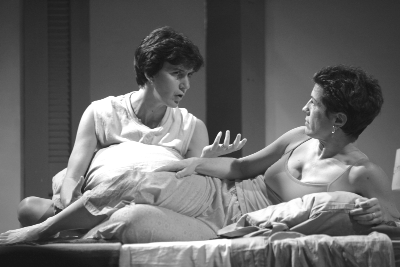An African paradise invites disquiet; Five Lesbian Brothers dig deep in Palm Springs’ sands
One cannot deny the proficiency or musicality of the company of “Drumstruck.”
The 90-minute drumming extravaganza draws on African traditions to create an audience-participation spectacle on the surface as benign and technically dazzling as “Stomp” or “Blue Man Group.” It features the gimmick of audience participation in that every member of the audience is given a drum to whale away on at will, and while there is some guidance—and even drumming lessons—in the course of the show, I am always of the mind that some things are better left to the experts.
Such is the case with this show.
If you arrive early, as about two-thirds of the audience did the night I saw it, you will be treated to a barrage of random drum pounding, which in my curmudgeonly case, gave me a surfeit of drumming even before the show began.
The charming and engaging company’s delightfully orchestrated pieces inspire one to hear and marvel at the complexity and beauty of the sounds being made. If you can experience “Drumstruck” on that level, you may find it quite engaging.
But don’t look too deep. Despite my admiration for the skill of the music, as a piece of theater, “Drumstruck” is disappointing, and at some points disquieting. Rather than simply being a concert or an abstract performance piece, “Drumstruck” insists on educating us about Africa and traditions, but in a manner so simplistic and condescending that it feels like a junior high school assembly for “Diversity Day.” The happy face painted on tribal life in Africa is unnerving, particularly considering the strife, turmoil and starvation afoot in Africa today. “Drumstruck” ultimately panders to attractive, but outdated stereotypes and as such becomes a kind of minstrel show.
Every show need not be political and light entertainment has its place in the theater. But in denying how traditional life is threatened, or in many cases gone for good, in Africa and in ignoring modern crises, the show runs the risk, particularly in our willfully ignorant culture, of suggesting that the current reality is a rosy one. I couldn’t help but be reminded of the 1992 musical, “Sarafina!,” which blended political theater with the Western musical format and traditional African music. That made for far more galvanizing theater and its impact on African political life has been well-documented.
I understand that that is not the goal of “Drumstruck,” but for all the pyrotechnics of this show, the experience still seems as hollow as, well, a drum.
As I was leaving New York Theatre Workshop the other night, I heard someone complaining bitterly, “Well I liked it, but I figured out the plot twist right away.”
When a play is called “Oedipus at Palm Springs” and is about four lesbians at a gay retreat, what “plot twist” could be really surprising? Part of the fun of this delightful new play by the Five Lesbian Brothers is watching how the outsized elements of Greek tragedy have been interpreted for mere mortals on the ground.
Along the way, we are treated to a hilarious send-up of contemporary relationships, our over-dependence on therapy, psychic readings, gender roles in same-sex couplings and some often-poignant affairs of the heart. It is great fun to see how these are interpreted into the standard devices of a Greek tragedy, particularly as Joni, the resort manager, takes on the oracular and chorus responsibilities. While I won’t tell you how the “plot twist” is achieved—you really should go see for yourself—I can report that the balance of irony, comedy (some wonderful cheap jokes, too) and tragedy is finely crafted and that, for all its theatricality, this play is at heart is one of the most human gay plays of recent seasons. I almost cringe at categorizing it as a “gay play,” in fact, because there is a relevance and artfulness to the piece that transcends sexuality.
Yet, the play largely has to do with sex. Two couples have escaped for a weekend in Palm Springs to a lesbian hideaway (surprisingly for Palm Springs not clothing optional) to celebrated Terri’s 37th birthday. Terri’s partner Prin, 15 years her senior, is a sexually attuned and successful woman, and the butch/femme roles are clearly defined. Their friends, Con and Fran, are getting away for the first time in a while, and the four plan a weekend of golf (butch) and outlet shopping (femme). However, things start to get weird from the get-go.
There are several longish sex scenes with, just like in real life, mixed results. As Prin and Terri celebrate their sensuality as one of the cornerstones of their relationship, Fran and Con struggle to regain intimacy after having a baby together. What works about both of these relationships and the sex these women have are the honesty and the simplicity conveyed.
Gay sex remains too often sensationalized in the mainstream media, and lesbian sex specifically is almost always played these days for the jokes about hetero male titillation. The multi-faced experiences and the vulnerability of these women—and the courage to present these on the stage—elevates this play beyond “gay;” the couples’ relationships become emblematic of the struggle any human undergoes in the quest for intimacy and fulfillment in and through another person. The delicate balance between the private experience and public presentation of sexuality is something that is endemic to our contemporary world—and has perhaps become one of the defining tensions of our time. When anything goes, and the choices seem limitless, can we get past our own egos enough to make a choice and take stick with it?
One of the beauties of “Oedipus at Palm Springs” is that the choice that comes to define the play’s theme is made by the character from whom it might be least expected, and it is played out a in manner that is the most elementally human—and therefore the most tragic.
The performances are superlative. What is remarkable about these women, who are working together for the first time in six years, is their emotional honesty and their technical expertise. There isn’t a performance in the play that isn’t finely tuned and deeply felt. Watching this level of skill from the company––Babs Davy as Joni; Lisa Kron as Con; Maureen Angelos as Fran; Dominique Dibbell as Prin and Peg Healey as Terri—is sublime.
The wonderful, very-Palm Springs set is by David Korins, the dead-on costumes are by Miranda Hoffman, and the astonishing lighting is by Mary Louise Geiger.
gaycitynews.com



































